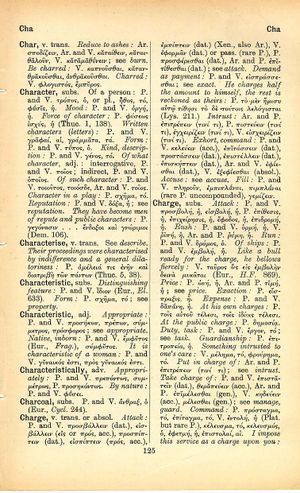character: Difference between revisions
m (Text replacement - "(|thumb)\n(\|link=)" to "$1$2") |
m (Woodhouse1 replacement) |
||
| Line 1: | Line 1: | ||
{{Woodhouse1 | {{Woodhouse1 | ||
|Text=[[File:woodhouse_125.jpg|thumb|link={{filepath:woodhouse_125.jpg}}]] | |Text=[[File:woodhouse_125.jpg|thumb|link={{filepath:woodhouse_125.jpg}}]] | ||
===substantive=== | |||
of a [[person]]: P. and V. [[τρόπος]], ὁ, or pl., [[ἦθος]], τό, [[φύσις]], ἡ. | of a [[person]]: [[prose|P.]] and [[verse|V.]] [[τρόπος]], ὁ, or pl., [[ἦθος]], τό, [[φύσις]], ἡ. | ||
[[mood]]: P. and V. [[ὀργή]], ἡ. | [[mood]]: [[prose|P.]] and [[verse|V.]] [[ὀργή]], ἡ. | ||
[[force of character]]: P. | [[force of character]]: [[prose|P.]] [[φύσεως ἰσχύς]], ἡ ([[Thucydides|Thuc.]] 1, 138). | ||
[[written characters]] ([[ | [[written characters]] ([[letter]]s): [[prose|P.]] and [[verse|V.]] [[γραφαί αἱ]], [[γράμματα]], τά. | ||
[[form]]: P. and V. [[τύπος]], ὁ. | [[form]]: [[prose|P.]] and [[verse|V.]] [[τύπος]], ὁ. | ||
[[kind]], [[description]]: P. and V. [[γένος]], τό. | [[kind]], [[description]]: [[prose|P.]] and [[verse|V.]] [[γένος]], τό. | ||
[[of what character]], adj.: interrogative, P. and V. [[ποῖος]]; indirect, P. and V. [[ὁποῖος]]. | [[of what character]], adj.: interrogative, [[prose|P.]] and [[verse|V.]] [[ποῖος]]; indirect, [[prose|P.]] and [[verse|V.]] [[ὁποῖος]]. | ||
[[of such character]]: P. and V. | [[of such character]]: [[prose|P.]] and [[verse|V.]] [[τοιούτος]], [[τοιόσδε]], [[Aristophanes|Ar.]] and [[verse|V.]] [[τοῖος]]. | ||
[[character in a play]]: P. [[σχῆμα]], τό. | [[character in a play]]: [[prose|P.]] [[σχῆμα]], τό. | ||
[[reputation]]: P. and V. [[δόξα]], ἡ; see [[reputation]]. | [[reputation]]: [[prose|P.]] and [[verse|V.]] [[δόξα]], ἡ; see [[reputation]]. | ||
[[they have become men of repute and public characters]]: P. | [[they have become men of repute and public characters]]: [[prose|P.]] [[γεγόνασιν… ἔνδοξοι καὶ γνώριμοι]] ([[Demosthenes|Dem.]] 106). | ||
}} | }} | ||
{{Lewis | {{Lewis | ||
Revision as of 09:15, 20 May 2020
English > Greek (Woodhouse)
substantive
of a person: P. and V. τρόπος, ὁ, or pl., ἦθος, τό, φύσις, ἡ.
force of character: P. φύσεως ἰσχύς, ἡ (Thuc. 1, 138).
written characters (letters): P. and V. γραφαί αἱ, γράμματα, τά.
kind, description: P. and V. γένος, τό.
of what character, adj.: interrogative, P. and V. ποῖος; indirect, P. and V. ὁποῖος.
of such character: P. and V. τοιούτος, τοιόσδε, Ar. and V. τοῖος.
character in a play: P. σχῆμα, τό.
reputation: P. and V. δόξα, ἡ; see reputation.
they have become men of repute and public characters: P. γεγόνασιν… ἔνδοξοι καὶ γνώριμοι (Dem. 106).
Latin > English (Lewis & Short)
chăracter: ēris, m., = χαρακτήρ.
I An instrument for branding or marking, etc.: character est ferrum coloratum, quo notae pecudibus inuruntur, χαρακτήρ autem Graece, Latine forma dicitur, Isid. Orig. 20, 16, 7.—
II Usu., the mark or sign burned or imprinted.
A Prop. (esp. upon animals): quadrupedia charactere signare, Col. 11, 2, 14; Pall. Jan. 16: characterem infigere alicui, Aug. Contr. Cresc. 1, 30.—
B Trop., a characteristic, mark, character, style, etc. (only ante- and postclass.): Luciliano charactere libelli, Varr. R. R. 3, 2, 17; Serv. ad Verg. E. 3, 1; Diom. p. 481 P. (cf. Cic. Or. 39, 134; id. Q. Fr. 2, 15 (16), 5; and Gell. 7, 14, 1, in which passages it is written as Greek).
Latin > French (Gaffiot 2016)
chăractēr, ēris, m. (χαρακτήρ),
1 fer à marquer les bestiaux : Isid. Orig. 20, 16, 7 || marque au fer : Col. Rust. 11, 2, 14
2 [fig.] caractère, particularité d’un style : Luciliano charactere libelli Varro R. 3, 2, 17, satires dans la manière de Lucilius [en grec d. Cic. Or. 134 ].
Latin > German (Georges)
charactēr (caractēr), ēris, Akk. ēra, m. (χαρακτήρ), I) das Werkzeug zum Einbrennen, -Einschneiden usw. (Isid. 20, 16, 7); dah. meton., das (bes. den Tieren) eingebrannte, eingestochene Zeichen, -Mal, Col. u.a. – II) übtr.: a) die charakteristischen Züge, Charaktere, als Zauberschrift usw., Eccl. – b) das Charakteristische in der Darstellung, das eigentümliche Gepräge, der jmdm. eigentümliche Stil, Varr. r. r. 3, 2, 17. Vopisc. Aurel. 1, 6. Serv. Verg. ecl. 3, 1 (Cic. or. 134 u. Gell. 7, 14, 1 griech. geschr.).
Latin > English
character characteris N M :: branded/impressed letter/mark/etc; marking instrument; stamp, character, style

